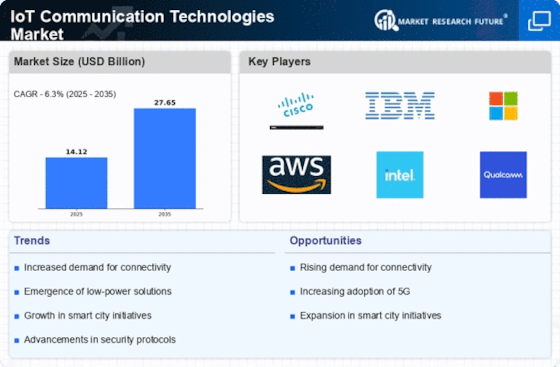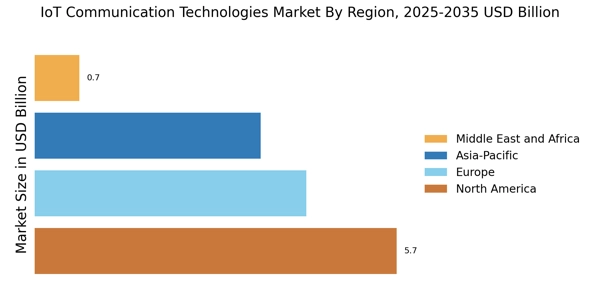Rising Demand for Smart Devices
The proliferation of smart devices is a primary driver of the IoT Communication Technologies Market Industry. As consumers increasingly adopt smart home devices, wearables, and connected appliances, the demand for seamless communication technologies intensifies. In 2025, it is estimated that the number of connected devices will surpass 30 billion, necessitating robust communication frameworks. This surge in device connectivity compels manufacturers to innovate and enhance communication protocols, ensuring interoperability and efficiency. Consequently, the IoT Communication Technologies Market Industry is poised for substantial growth, as companies strive to meet the escalating demand for reliable and efficient communication solutions.
Increased Focus on Security Solutions
As the number of connected devices continues to rise, the emphasis on security solutions within the IoT Communication Technologies Market Industry becomes increasingly critical. Cybersecurity threats pose significant risks to the integrity of IoT systems, prompting organizations to invest in robust security measures. By 2025, the global market for IoT security is projected to reach billions, driven by the need to protect sensitive data and ensure the reliability of communication networks. This heightened focus on security not only fosters consumer trust but also encourages innovation in communication technologies, as companies strive to develop secure and resilient IoT solutions. Thus, the IoT Communication Technologies Market Industry is likely to benefit from this growing demand for enhanced security.
Advancements in Network Infrastructure
The ongoing advancements in network infrastructure significantly influence the IoT Communication Technologies Market Industry. The rollout of 5G technology is particularly noteworthy, as it offers enhanced speed, lower latency, and greater capacity for connected devices. By 2025, it is projected that 5G networks will cover a substantial portion of urban areas, facilitating real-time data transmission and enabling new applications in various sectors. This technological evolution not only supports the growing number of IoT devices but also enhances the overall user experience. As a result, the IoT Communication Technologies Market Industry is likely to witness increased investment and innovation in communication technologies.
Government Initiatives and Regulations
Government initiatives and regulations play a crucial role in shaping the IoT Communication Technologies Market Industry. Policymakers are increasingly recognizing the potential of IoT technologies to drive economic growth and improve public services. In 2025, various governments are expected to implement supportive policies and frameworks that promote the development and deployment of IoT solutions. These initiatives may include funding for research and development, as well as the establishment of standards to ensure interoperability and security. Such regulatory support is likely to stimulate investment in the IoT Communication Technologies Market Industry, fostering innovation and encouraging the adoption of advanced communication technologies across various sectors.
Integration of Artificial Intelligence
The integration of artificial intelligence (AI) into IoT communication technologies is emerging as a pivotal driver in the IoT Communication Technologies Market Industry. AI enhances data processing capabilities, enabling devices to learn from user behavior and optimize communication protocols. This synergy between AI and IoT is expected to create smarter, more responsive systems that can adapt to changing conditions. By 2025, the market for AI in IoT is anticipated to reach several billion dollars, reflecting the growing recognition of AI's potential to revolutionize communication technologies. Consequently, the IoT Communication Technologies Market Industry is likely to experience accelerated growth as businesses leverage AI to enhance operational efficiency and user engagement.
















